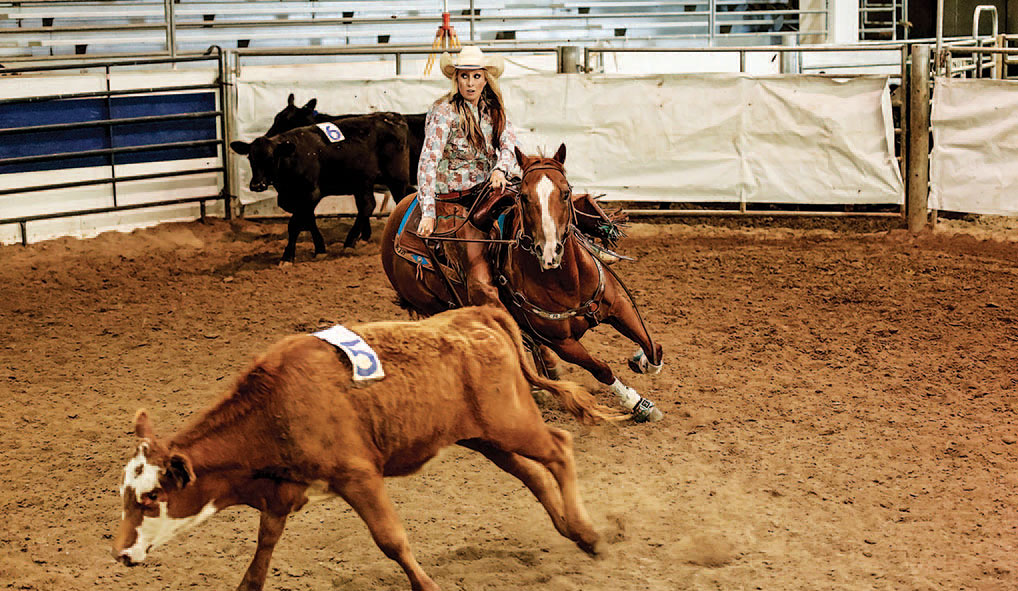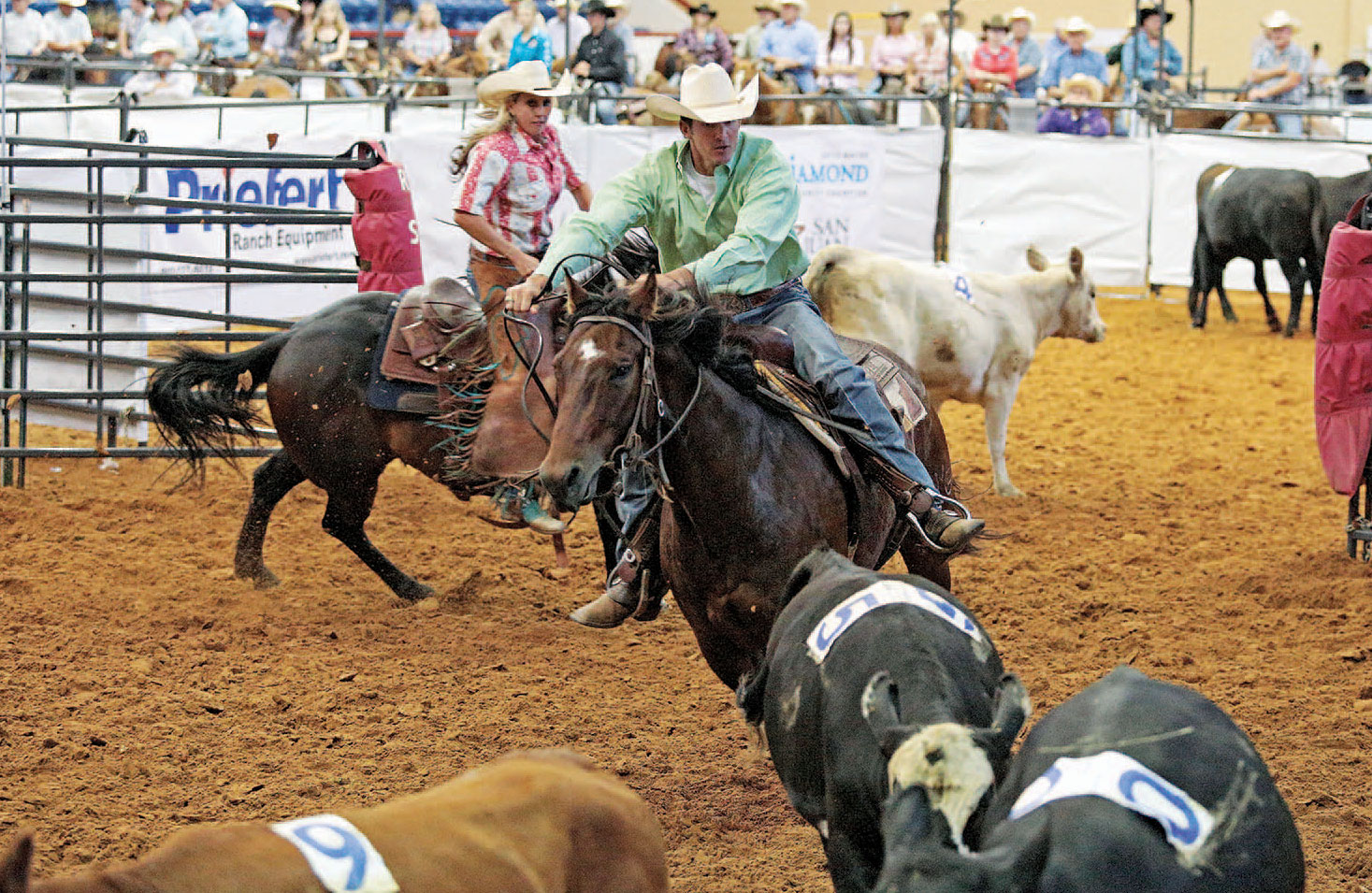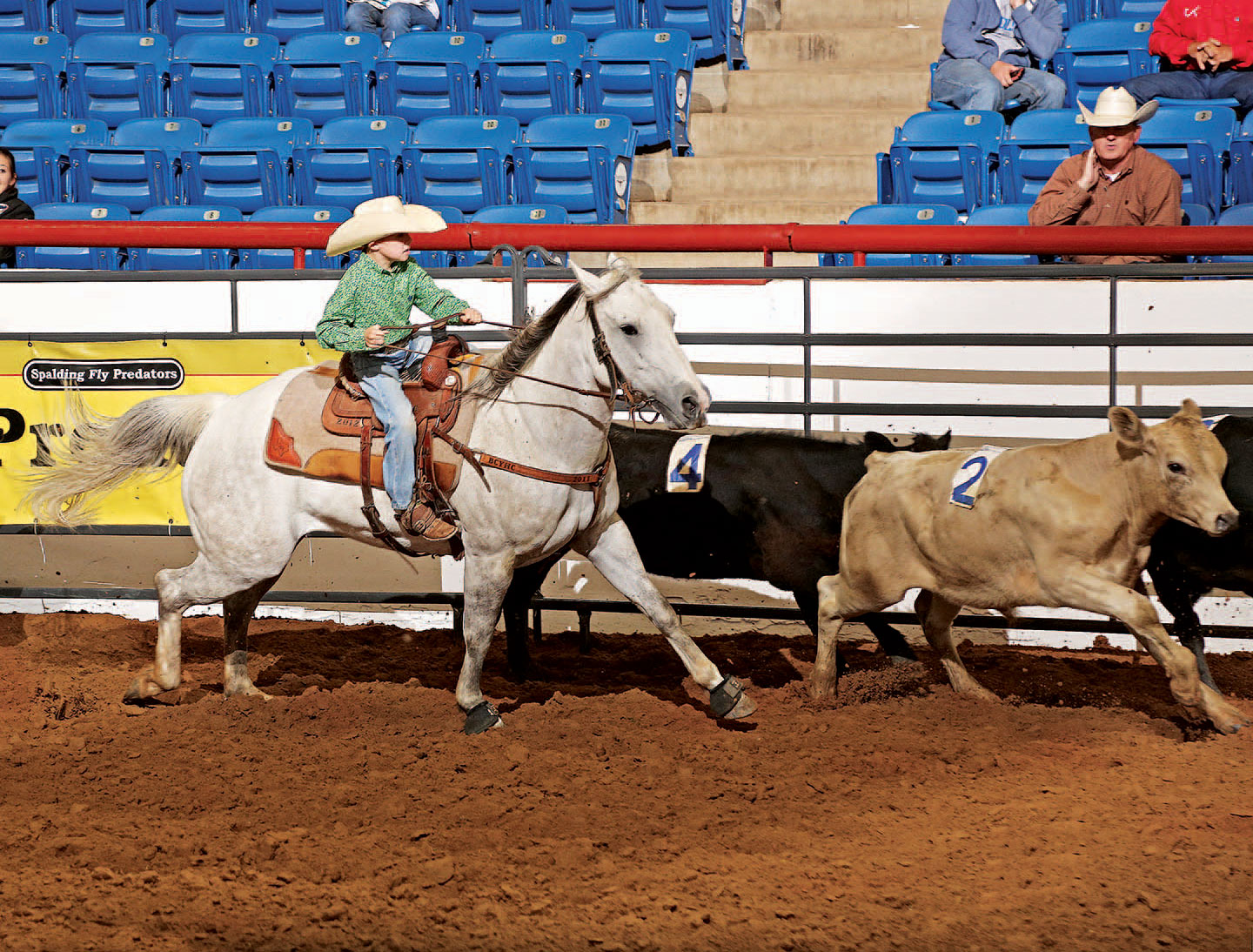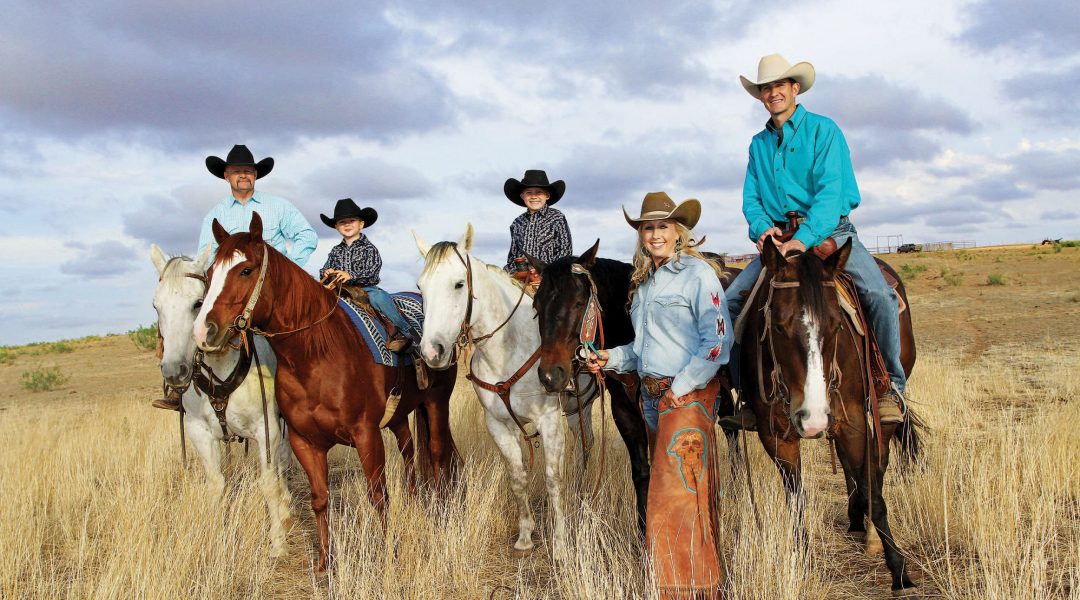Ranch sorting is one of the fastest-growing equine sports thanks to a family-friendly format that encourages riders from 7 to 77 to saddle up and get in the pen.
For the Day family, ranch life was fulfilling, but it was also a lot of work and not a lot of play. Even the rare times they left the ranch for a stock show were business trips. For Katie Jo and her husband, Rusty; in-laws Ricky and Cindy; and sons, Ryder, 9, and Riggin, almost 6; success in their show cattle operation meant keeping their noses to the grindstone.
That hasn’t changed, but a few years ago Katie Jo stumbled across a much-needed outlet for family recreation advertised on a flyer. When she looked up the organization online, she discovered the perfect Day family activity — competitive ranch sorting.
The sport of ranch sorting is growing exponentially, explains Ranch Sorting National Championships president Dave Wolfe. It’s thanks to working ranch families like the Days — as well as to aspiring cowboys and cowgirls who want to try their hand at true-life ranch skills.
“The big sell to me is that it’s without question a perfect Western heritage event,” Wolfe says. “Especially when I go outside of the United States, it amazes me how many people look at us as the Western frontier. Everyone wants to be an American cowboy or cowgirl, and we have an opportunity to let everyone do that.”

Ranch sorting is a traditional ranch rodeo event that involves moving cattle by a team on horseback. Created to preserve the traditional skills of working cow horses and ranch hands, sorting requires two riders to move a herd of 10 cattle in numerical order from one round pen into an adjoining pen in 60 seconds or less.
The very core of ranch sorting harkens back to actual ranch work — sorting herds for medication, breeding, and other purposes. “We’ve brought that cowboy task to town and made a competition out of it,” Wolfe says, “and because of that, you don’t have to own a ranch. You don’t have to own cattle. You can own a horse in the backyard and go to a competition and do what the top cowboys in the country have done for hundreds of years, and that’s a wonderful thing.”
Wolfe has spent his adult life in the equine industry, serving as a judge in the American Quarter Horse and American Paint Horse associations and running a successful team penning organization. He began hosting ranch sorting events on the side to provide an outlet for novice riders who needed a more controlled environment to compete successfully. Because ranch sorting takes place in a smaller physical space with fewer cattle, it is more about finesse than speed. And by setting up a rating system that allows time handicaps based on the experience of the competitor, Wolfe was able to open the sport up to a whole new field of participants.
“The wonderful part about ranch sorting is that a brand-new novice can come in, and if they are out of position, all they have to do is turn around to be right back in position, whereas for every other cow horse event, you have to go to the other end of the arena to get the cow back,” Wolfe says. “Grandma on a trail horse can come in and be competitive at the beginner level. There’s no other cow horse event out there where you can possibly do that.”
That’s not to say the competition isn’t stiff, he assures. “As competitors win checks, they graduate up levels,” Wolfe says. “As a result, the sport just took off.” In 2007, Wolfe formed RSNC to focus solely on ranch sorting with a grassroots model for “bring a friend” free membership incentives. The result has been a rapid growth in the number of participants. The RSNC now has more than 23,000 members and will sanction close to 400 events throughout the year.

Katie Jo and Rusty met in elementary school, and they grew up showing cattle together. They didn’t start dating until college, but it didn’t take long for the couple to realize they wanted the same future: to work a ranch in Texas raising show cattle and their future family.
The family’s herd has grown to several hundred head of cattle, and they now utilize the latest in breeding technologies, including some cloning. Rusty also farms cotton, peanuts, and wheat, so the work never slows down, especially in September when they have an average of 10 calves born a day.
As luck would have it, four years ago in September is precisely when Katie Jo crossed paths with that ranch sorting flyer that would change her family’s life.
“I didn’t know what it was. I’d never heard of it, and I thought, Well, that kind of sounds neat,” Katie Jo says. “This is our busiest time of year. It’s crunch time, pays-the-bills time of year for us. Anyway, I asked Ricky and Rusty if they thought they wanted to go. Well, of course I get the eye roll like, Yeah, uh-huh, like we’re going to get away this time a year.” Despite their skepticism, Katie Jo showed her father-in-law and husband video of the event on YouTube. She didn’t get much of a response at first, but as the weekend drew near, Ricky, an avid horseman, brought up the idea of going.
“Ricky said something like, ‘When is that sorting deal?’ And I said, ‘Oh, well, it’s tomorrow.’ And he said, ‘Well, if we’re not too busy, we might run up there and see what that is.’ And I was floored, because this man does not ever get off the Ponderosa,” Katie Jo says with a laugh.
The family took a break from their workload to check out the event and ended up making fast friends and falling in love with the sport. Katie Jo says that one of the best parts of their newfound sport is thepositive change she has witnessed in the family dynamic.
“This family, they’re amazing to be around, but everything was work and pretty much zero recreation. This is just completely laidback recreation time. What’s really great is we get to travel as a family, compete as a family. We’ve been successful as a family. Now it’s the thing we probably look forward to most.”
The Days have accomplished a lot in the sport, from Rusty winning back-to-back national championships to Ricky having back-to-back horses of the year and a high-point championship to Ryder winning his class at Nationals in 2014. Nevertheless, their mounts are legitimate ranch horses, and when they get home from shows, it’s back to work.
“We don’t have a fancy horse barn,” Katie Jo says. “They come home and they’ve got to go earn their keep and rope and drag calves and move cows.”
It’s back to work for the family too, but that doesn’t mean ranch sorting is far from their minds.
“Actually, this morning we had to go sort out one cow out of a group of 80 and push it through a gate. You have an awareness now about how it is like that sport you’re going to go to on Saturday,” Katie Jo says.

There have been many highlights over the last few years. But Katie Jo’s favorite might have to be when Ryder won his class at the RSNC Finals in 2014 with his dad, Rusty. In his first go-round, his trusty old mare’s bridle broke.
“This is just about 10 or 15 seconds into his run, and everybody started hollering at him, ‘Pull up! Go to the gate, Ryder. Stop!’ ” recalls Katie Jo. “Well, he just rode with his feet and it’s like that horse could count numbers. They went and sorted five more head and advanced to the final go, which they won. It was pretty unbelievable — one of those ‘wow’ moments you never could’ve scripted.”
Katie Jo looked over at Ricky, a tough old cowboy she says was born a few centuries too late, and he had tears in his eyes from his grandson’s feat.
It is this sort of experience, and the fun family atmosphere and friends they’ve made, that Katie Jo cites as why her family keeps coming back to ranch sorting.
And that’s just what Wolfe was hoping for.
“It’s without a question a wonderful family-oriented event because of our rating system and our different levels of competition,” he says. “Every member of a family has an opportunity to ride with somebody else of that family regardless of how skilled or unskilled they are. Because of that, it’s fun for everybody. We have entire families enjoying our sport, and I think that’s a huge benefit to the equine industry for people out there looking to do something with their horses.”
And it’s clear that ranch sorting isn’t just something to do with your horse — it’s something to do with each other as well.
From the May/June 2016 issue.













